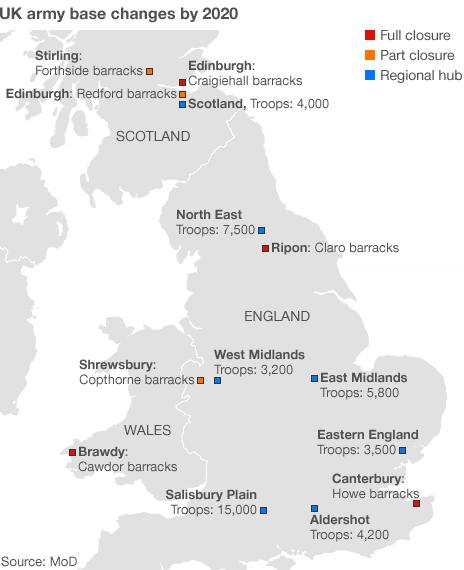Army bases to shut ahead of Germany troop withdrawal
- Published
Defence Secretary Philip Hammond: "The return of the troops from Germany marks end of an era"
Four Army bases are to close as part of a shake-up to accommodate thousands of troops returning from Germany.
Claro Barracks in North Yorkshire, Howe in Kent, Craigiehall in Edinburgh and Cawdor in Pembrokeshire will be shut.
Parts of Edinburgh's Redford barracks, Forthside in Stirling and Copthorne in Shropshire will also close.
Returning forces will be stationed around seven sites, including Salisbury Plain, Edinburgh and Leuchars, Catterick and Colchester.
The other sites are Aldershot, Stafford and the East Midlands.
There has been a British army presence in Germany for nearly 70 years.
Defence Secretary Philip Hammond said the return of troops from Germany marked the end of an era, and thanked the German government and people for their "material and moral" support.
He also told MPs the Household Cavalry will be moved from its well-known base at Hyde Park Barracks, in central London. He did not say where it would relocate to.
'Fair share'
He said the changes overall would save £240m a year in running costs as soldiers are moved into "clusters" in key locations, and the re-organisation bill would be £1.8bn.
Around £1bn of the funding will go towards 1,900 new houses for service families and accommodation for 7,800 single soldiers. Another £800m will be spent on infrastructure and refurbishment of bases.
BBC defence correspondent Jonathan Beale says the figures are open to debate.
"He says the MoD will spend almost £2bn on the move - much of that money on new service accommodation. To counter that cost he says leaving Germany will save around £240m a year," he said.
"Labour's already asking questions about the speed of the move and whether it's been properly funded."
Mr Hammond confirmed far fewer returning troops than previously thought will be based in Scotland but he insisted Scotland would still have "a little bit more than its fair share" of military personnel based on the size of its population.
The Scottish National Party says the government has reneged on an earlier promise that around 7,000 of the troops leaving Germany would be going to Scotland.
The number of troops in Wales and Northern Ireland will fall by 400, with around 120 soldiers based in Northern Ireland set to lose their jobs during the next 18 months.
Shadow defence secretary Jim Murphy said there would be "real disappointment" over the closures and "historic bonds" were being broken.
Wales Office Minister Stephen Crabb said the closure of the Cawdor Barracks - which Mr Hammond said was no longer "fit for purpose" - was "disappointing". But he welcomed a £100m investment in the St Athan base to which the 14th Signal Regiment (EW) unit is to relocate.
Under the 2010 strategic defence review, the government announced it wanted to withdraw all 20,000 troops in Germany, plus their families, by 2020.
Since then, about 4,000 troops have already moved back to the UK.
Shadow Defence Secretary, Jim Murphy: "This is an historic day"
Some 70% of the remaining troops will now return by the end of 2015 compared to a previous commitment of half by 2015, with the final 4,300 back by the end of 2019, a year earlier than planned.
The pull-out has been accelerated because there were bigger cuts to the Army than originally planned, saving money which then could be used for relocation.
The government says the changes will provide savings and efficiencies for the Army, and certainty for personnel and their families.
General Sir Peter Wall, Chief of the General Staff, said the plan provides "an excellent springboard for operations overseas".
Former army commander Col Richard Kemp - who spent 10 years in Germany during his military career - told the BBC he was not surprised by the announcement.
"The only reason that British forces have been in Germany... has been because it has been difficult to accommodate them back in the UK and provide proper training facilities.
"It appears the government has found a way of doing that so I think it's entirely reasonable that they should come back now," he said.
But Col Kemp added he was concerned about the potential lack of live firing and training facilities in the UK and the standard of barrack living quarters.
"Money will be saved be moving soldiers back quickly, but that should not be happening at the expense of the welfare, comfort and the facilities available for our troops and their families."

Regional hubs
Scotland encompasses Edinburgh and Leuchars.
West Midlands includes Stafford and Donnington barracks.
Salisbury Plain is made up of Tidworth, Bulford, Larkhill, Warminster, Perham Down and Upavon.
North East site includes Catterick, York, Dishforth, Topcliffe and Harlow Hill.
East Midlands encompasses Cottesmore and North Luffenham.
Eastern England includes Colchester and Swanton Morley.
- Published5 March 2013
- Published5 March 2013
- Published5 March 2013
- Published28 February 2013